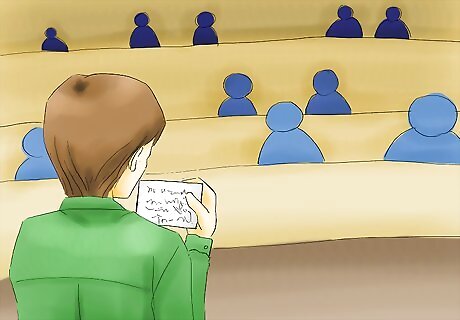
views
Preparing

Find out what's covered. Ask your instructor or the organization involved what kind of questions to be expected. Ask people who might have taken the exam before. Once you know the potential topics covered and the kinds of answers you'll be expected to give, you can get into the nitty gritty of your preparation.

Research the topics covered. There are two aspects to doing well on an oral exam: knowing your material, and practicing the presentation of it. You need to start your preparation just like studying for any other test. Study the material, arm yourself with potential answers, and know the topic through and through.

Practice providing verbal answers. It's been said that "a perfect practice makes perfection". Your mind might be fast at getting ideas, when you can't speak them clearly and convincingly, it's no use. Stand up, act as if you're already in front of the examiner. Repeat it till you are satisfied with your act. Possibly ask your friends or make the mirror your judge.
Taking the Exam

Be confident. Once you know you're prepared, there is no reason to panic; every examiner wants to see the confidence in your answers. Even if you say the correct words, when your expression shows doubt, you give the examiner chance to pick apart your response. Your boldness in attacking the questions is very important. Don't fret and don't get bogged with anything; clear your mind off any negative thoughts first and answer confidently.

Listen carefully. A lot of your preparation for oral exams will focus on your knowledge and speaking skills, but don't neglect the importance of close listening. If you mishear your examiner or the question is phrased in a way you don't expect, you'll be on a losing path. Open up your mind and there listen carefully to the question.

Interpret what's being asked, quickly and effectively. Good listening skills will help you hear how the question is being structured. Interpretation is the meaning you derived from the question. In this step, you don't need to think too much, thereby wasting time. However, you should be sure you understood what you heard and let your mind do the interpretation as quickly as to process the appropriate answer.

Get a clear idea of what you're saying before you open your mouth. It's okay to take a pause before answering. Your mind might have processed the answer, but if you can't communicate it aloud, you won't do well. Take a beat to plan your answer. Use the proper terminology for your topic. Let the examiner see no doubt in your words.

Try to project confidence through body language. Knowing the answer is a good thing, saying it out is another, but your reaction to the question defines your confidence or confusion. Even when you feel that question is tough to remember, smile as if it's something you already knew; the time you spend in smiling (for few seconds) will help you to process further on how to interpret the question. There are no guarantees, but sometimes in oral exams, you need not know all the answers; your presentation and confidence can sometimes make up for any topic areas you don't know as thoroughly. The way you give answers to both the known and unknown questions will make the examiner feel you know the topic, and just answered less than ideally because you're a human, prone to mistakes.

Try to be clear and concise. You want to be both fluent and eloquent. Don't reply as if you're talking to yourself; reply as if you are teaching the examiner. See them as your student who needs a point clarified. Don't be condescending, but be clear, and avoid rambling on for long periods of time once you've already given an effective answer.




















Comments
0 comment